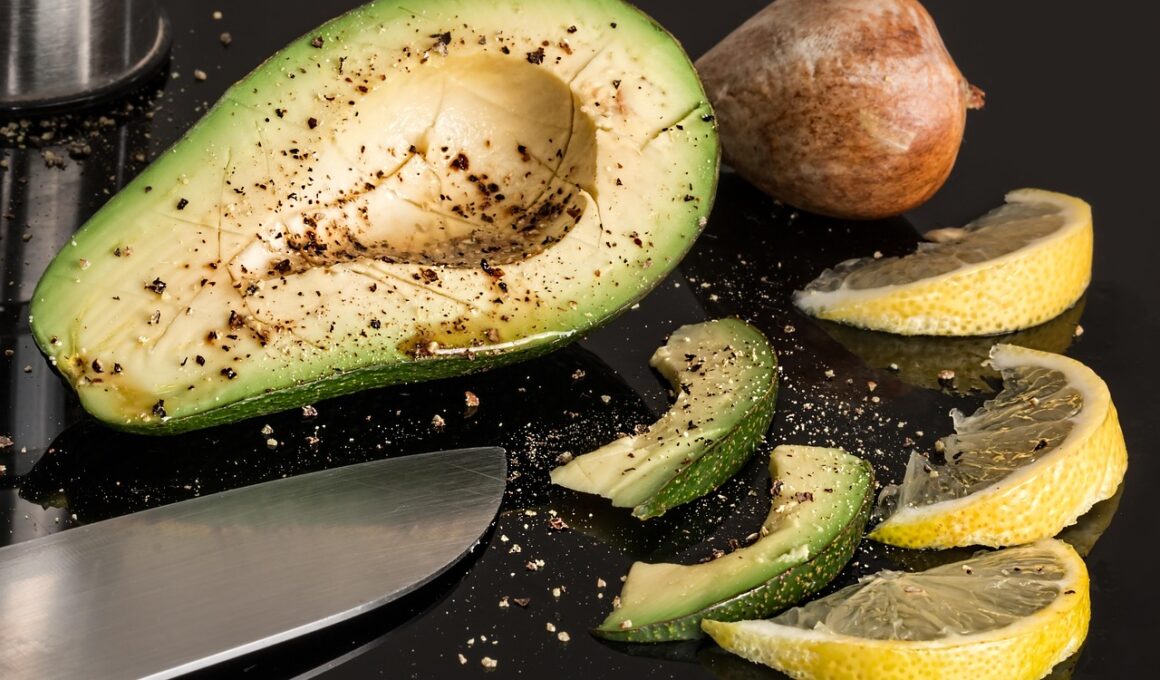Healthy Fats and Their Role in Hormonal Balance
Maintaining hormonal balance is crucial for overall health. One key aspect that often gets overlooked is the role of dietary fats. Healthy fats are essential for hormone production because they provide the necessary building blocks. Your body utilizes fats to create cholesterol, which is the precursor for the hormones progesterone, testosterone, and estrogen. Without adequate healthy fat intake, hormonal imbalances may occur, leading to various health issues. Incorporating a balance of omega-3 and omega-6 fatty acids is vital for maintaining hormonal equilibrium. Good sources include fish, flaxseeds, and walnuts. Furthermore, these fats assist in reducing inflammation, a crucial component for optimal hormone function. High-quality fats can improve insulin sensitivity as well, proving beneficial in managing weight and preventing chronic diseases. Overall, understanding the importance of healthy fats can help individuals make informed dietary choices that enhance hormonal health. In this article, we shall delve deeper into specific fat sources and their unique benefits for hormonal balance.
Healthy fats can be found in a variety of foods, each offering unique benefits. For example, avocado is a rich source of monounsaturated fats, which can improve heart health while promoting hormone regulation. Olive oil is another fantastic option rich in oleic acid, which helps balance cortisol levels, a stress-related hormone. Nuts and seeds, such as almonds and sunflower seeds, provide essential fatty acids that contribute to hormone production, supporting adrenal function. Fatty fish, like salmon and mackerel, are abundant in omega-3 fatty acids, known for their anti-inflammatory properties. This quality is particularly important for managing conditions related to hormonal fluctuations. Coconut oil contains medium-chain triglycerides (MCTs), which offer a quick energy source and assist in metabolism regulation. Grass-fed butter is another example of healthy fat that contains beneficial nutrients like conjugated linoleic acid (CLA), renowned for supporting body composition and metabolic health. Incorporating a variety of these healthy fats into your diet can significantly impact hormonal well-being and overall health.
Understanding the different types of fats is vital for hormone health. Saturated fats have long been criticized, but recent research suggests they can be beneficial when sourced from healthy, whole food sources. Examples include grass-fed beef and dairy. Monounsaturated fats, as mentioned earlier, contribute to heart health and hormone production. Polyunsaturated fats consist of omega-3 and omega-6 fatty acids, both of which play critical roles in regulating inflammation and hormonal balance. However, it’s essential to maintain an appropriate ratio of omega-3 to omega-6, as an excess of the latter can lead to inflammation and hormonal imbalances. Trans fats, found in processed foods, should be avoided entirely, as they adversely affect hormone health. When selecting fats for your diet, aim for quality over quantity. Prioritize whole-food sources rich in nutrients that support your body’s needs. Mindful selection and consumption of healthy fats can foster a strong foundation for maintaining hormonal balance, enhancing your overall health and vitality.
Practical Ways to Incorporate Healthy Fats
Incorporating healthy fats into your daily meals doesn’t have to be complicated. Start by adding avocado slices to your salads or toast for a creamy texture and nutrient boost. Another simple method is to use olive oil as a dressing for your vegetables. Not only does it enhance the flavor, but it also helps absorb fat-soluble nutrients effectively. Snacking on nuts or seeds can significantly satisfy your cravings while delivering healthy fats. Consider making energy balls by blending nuts, seeds, and dates for a nutritious on-the-go snack. Incorporating fatty fish into your weekly meals is another excellent strategy; aim for at least two servings per week. Try baking or grilling fish with herbs for added flavor. Coconut oil is versatile and can be used for cooking or in smoothies, lending a great taste and energy source. Keep in mind that even though fats are beneficial, moderation is key. Balancing your intake with other food groups can help maintain overall health while promoting hormonal balance.
In addition to incorporating healthy fats through foods, it’s important to consider cooking methods that maintain their integrity. Overheating can cause some fats to become harmful and lose their nutritional value. Use gentle cooking techniques such as steaming, baking, or sautéing at lower temperatures to preserve the health benefits of these fats. When grilling or frying, opt for oils with a high smoke point, like avocado oil, to prevent degradation. It’s also wise to focus on whole food consumption instead of processed options. Whole foods, such as avocados, nuts, and seeds, retain their nutrients better than their processed counterparts. Be aware of hidden trans fats in pre-packaged and fried foods. Staying informed helps you make better choices. Lastly, consulting a healthcare provider or registered dietitian can lead to personalized guidance based on your unique needs. Tackling hormonal balance involves a holistic approach, and healthy fats play a pivotal role. Awareness, education, and mindfulness can significantly improve your dietary habits.
The Impact of Inadequate Fat Intake
Lack of healthy fats in your diet can lead to several adverse health effects, particularly regarding hormonal health. Many individuals may experience reduced hormone production, leading to symptoms such as fatigue, mood swings, and weight fluctuations. Additionally, deficiencies in essential fatty acids may impair brain function, resulting in memory issues and cognitive decline. Hormonal imbalances can also contribute to skin problems, such as dryness and acne. Women, in particular, may face menstrual irregularities as a result of inadequate fat intake, which can disrupt estrogen and progesterone levels. Furthermore, the inability to absorb fat-soluble vitamins A, D, E, and K can manifest as various health issues, including weakened immune response and compromised bone health. When hormone levels are imbalanced, it may increase the risk of developing conditions like polycystic ovary syndrome (PCOS) and endometriosis. By prioritizing healthy fats in your diet, you can help prevent these negative outcomes while optimizing your hormonal health and overall well-being.
Maintaining a balanced diet rich in healthy fats also encourages lifelong habits that support hormonal balance. It’s crucial to develop an awareness of the importance of these nutrients, which can lead to healthier lifestyle choices. Being mindful of portion sizes when consuming fats fosters a balanced approach to eating without sacrificing enjoyment. Try to experiment with new recipes that incorporate these fats creatively, such as making smoothies with flaxseed oil or spreading almond butter on whole-grain toast. In addition, consider meal prepping with healthy fat sources like chicken breast cooked in olive oil or using avocado in various dishes. It’s also beneficial to focus on whole, unprocessed foods that contain natural fats rather than refined oils or unhealthy snacks. Remember to listen to your body’s hunger and fullness cues to establish a healthy relationship with food. By integrating and prioritizing healthy fats into your daily lifestyle, you can empower yourself to achieve hormonal balance while enjoying the multitude of health benefits they provide.
Conclusion and Recap
In summary, healthy fats play a critical role in maintaining hormonal balance and overall well-being. They serve as essential nutrients for hormone production, reduce inflammation, and help stabilize metabolic functions. It’s important to include various sources of these beneficial fats in your diet. Foods such as avocados, nuts, seeds, olive oil, and fatty fish provide unique advantages for hormonal health. Understanding the differences between types of fats ensures you make informed choices. Incorporating healthy fats into your meals enhances not only pleasure but also nutrient absorption. Besides focusing on fat quality, consider the cooking methods used to ensure preservation of their beneficial properties. Additionally, awareness of the adverse effects of inadequate fat intake highlights the significance of these essential nutrients. Lastly, embracing healthy lifestyle choices, such as meal prepping and trying new recipes, can set the foundation for lifelong habits supporting hormonal balance. By prioritizing healthy fats, you empower yourself to optimize hormonal health, leading to improved vitality, well-being, and quality of life.





